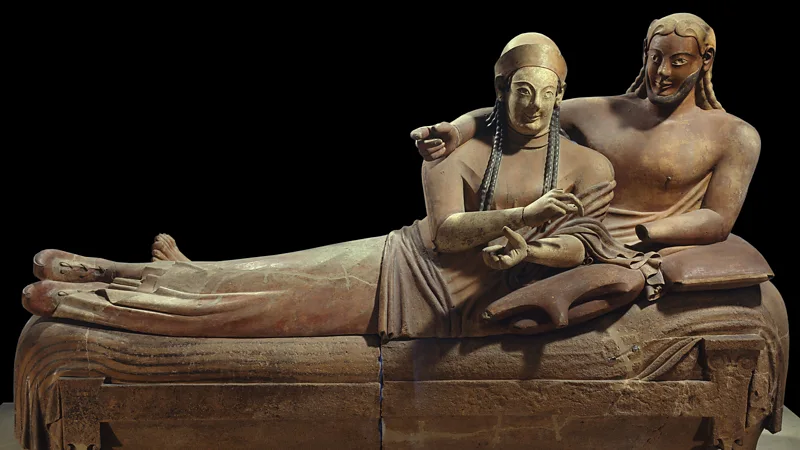'A woman should cast off her shame together with her clothes': What women in ancient times really thought about sex
A new book tells the history of the ancient world through women. Here author Daisy Dunn explores what they had to say about their own sexuality – flying in the face of misogynist male stereotypes.

According to Semonides of Amorgos, a male poet working in Greece in the 7th Century BC, there are 10 main kinds of women. There are women who are like pigs, because they prefer eating to cleaning; women who resemble foxes, as they are peculiarly observant; donkey-women, who are sexually promiscuous; dog-women, marked for their disobedience. There are stormy sea-women, greedy Earth-women, thieving weasel-women, lazy horse-women, unattractive ape-women, and – the one good kind – hard-working bee-women.
Of all the women described in this list, which pulsates with the misogyny of the time, those so-called sexually promiscuous "donkey-women" are perhaps the most mysterious.
Historical accounts from the ancient world tend to reveal the cloistered nature of women's lives. In Greece, women were usually veiled in public, and in Rome, they had "guardians" (ordinarily their father or husband) to supervise their movements and handling of property. Was the concept of the lusty woman pure male fantasy? Or were women of the ancient world more interested in sex than is generally believed?
As I learned while researching my new book The Missing Thread, the first history of the ancient world to be written through women, we have to look hard if we want to uncover what women really thought about sex.
So far were ancient women from flinching at the sight of erotica that some were even buried with it
The vast majority of the surviving sources were written by men who were prone to exaggerate women's sexual habits in one direction or the other. Some went to such lengths to emphasise a woman's virtue that they made her seem almost saintly and inhuman. Others purposely presented women as sexually voracious as a means of blackening their characters. If we took these descriptions at face value, we would come to the conclusion that women in the ancient world were either all chaste, or sex-mad. Fortunately, it is possible to peer into the hearts of some classical women, who provide a far deeper view of female sexuality.
Confessions of infatuation
Looking to the same period as the poet quoted above, we encounter Sappho, who composed lyric poetry on the Greek island of Lesbos in the 7th Century BC. Gazing at a woman sitting talking to a man, Sappho documented the intense physical sensations she experienced – fluttering heart, faltering speech, fire through the veins, temporary blindness, ringing ears, cold sweat, trembling, pallor – all of which are familiar to anyone who's ever fallen in lust. In another poem, Sappho described garlanding a woman with flowers and reminisced wistfully about how, on a soft bed, she would "quench [her] desire". These are the confessions of a woman who understands the irrepressibility of infatuation.
Sappho's poems are so fragmentary today that it can be difficult to read them accurately, but scholars have detected in one of the papyri a reference to "dildos", known in Greek as olisboi. These were employed in fertility rituals in Greece, as well as for pleasure, and feature as such on a number of vase paintings. Later in Rome, too, phallic objects had a talisman-like quality. It would not have made sense for women to shy away from symbols that were believed to bring good luck.
So far were ancient women from flinching at the sight of erotica that some were even buried with it. In the period before Rome came to prominence, the highly skilled Etruscans dominated the Italian mainland and filled it with scenes of a romantic nature. Numerous works of art and pieces of tomb statuary depict men and women reclining together. An incense burner featuring men and women touching each other's genitals was interred with an Etruscan woman in the 8th Century BC.
How prostitution was perceived
You only have to visit an ancient brothel, such as those of Pompeii, to see that sex was frequently on show. The walls of the dismal, cell-like rooms in which sex workers plied their trade are covered in graffiti, much of it written by male clients, who liked to comment on the performances of named women.
Historical accounts and speeches abound with descriptions of the hardships endured by such workers. Against Neaera, a prosecution speech delivered by Athenian politician Apollodorus in the 4th Century BC, provides particularly startling insight into the precariousness of these women's lives. Just occasionally, however, we hear from a woman in touch with this world – and her words surprise.
In the 3rd Century BC, a female poet named Nossis living in the toe of Italy wrote in praise of an artwork and the fact that it was funded by a sex worker. A glorious statue of Aphrodite, goddess of sex and love, sung Nossis, had been erected in a temple using money raised by Polyarchis.
Polyarchis was not an anomaly. An earlier hetaera (courtesan or high-status sex worker) called Doricha used the money she had acquired similarly to purchase something for public view, in her case impressive spits for cooking oxen to be displayed at Delphi.
It was not sex these women embraced but rather the rare chance it afforded them to be remembered after they died. The vast majority of the women they knew were destined for anonymity.
Male writers' insights
Male writers, for all their prejudices, can provide some of the most interesting insights into women and sex. In 411 BC, the comedian Aristophanes put on a play called Lysistrata, in which the women of Athens organise a sex strike in a bid to persuade their husbands to agree peace terms during the Peloponnesian War. This was a real conflict, waged between Athens and Sparta and their respective allies across three decades.
Many of the women in the play are less than pleased at having to give up their pleasure. They are made to conform to the donkey-woman stereotype for comic effect. There is a moment, however, at which the play turns in a serious direction and Aristophanes offers a more convincing female viewpoint.
The title character Lysistrata, who organises the strike, describes what it is really like for women in wartime. Not only are they banned from the Assembly, in which the war is discussed, but they are repeatedly bereaved. And while such a protracted conflict is hell for married women, it is still worse for unmarried women, who are deprived of the chance to marry altogether.
It was quite usual among the upper classes for marriages to be arranged – and a woman's first experience of sex could be disorientating
While the men, Lysistrata points out, may return home from war grey-haired and still marry, the same does not hold true for virgins, many of whom will be deemed too old to wed and procreate. These lines convey the difference between the male and the female experience of war so accurately that it is tempting to believe that they reflect what women of the day were really saying.
We may find real women's fears surrounding sex expressed in Greek tragedy too. Sophocles, the playwright most famous for Oedipus Rex, had a female character in his lost play Tereus describe what it is like to go from being a virgin to a wife. "And this, as soon as one night has yoked us," utters Procne, a mythical queen, "we must commend and deem to be quite lovely".
It was quite usual among the upper classes for marriages to be arranged. A woman's first experience of sex could be as disorientating as Procne described.
Ancient sex tips
Women sometimes committed such thoughts to papyrus. In a letter attributed to her, Theano, a Greek female philosopher in the circle of Pythagoras (some say she was his wife), offers her friend Eurydice some timeless advice. A woman, she writes, should cast off her shame together with her clothes when she enters her husband's bed. She can put both back on together as soon as she has stood up again.
Theano's letter has come under scrutiny and may not be authentic. Nevertheless, it closely echoes what many women have said to each other in more modern times, and its advice seems to have been followed by women in the ancient world as well.
A certain Greek poet, Elephantis, was allegedly so keen to give women sex tips that she wrote her own short books on the topic. There is sadly no sign of her work today, but it is mentioned by both the Roman poet Martial and the Roman biographer and archivist Suetonius, who claimed that Emperor Tiberius (notorious for his sexual appetites) owned copies.
Where other women are quoted in other men's writings, they tend to express themselves in terms of love as opposed to sex explicitly, which marks them out from some of their male contemporaries, including Martial and Catullus.
Lesbia, the pseudonymous lover of Catullus, tells him that "What a lady says to her lover in the moment / Ought to be written on the wind and running water". The phrase "pillow talk" comes to mind.
Sulpicia, one of the few Roman poetesses whose verses survive, describes her misery at being in the countryside away from her lover Cerinthus on her birthday – and then her relief that she can be in Rome after all.
These women did not need to describe sex with their beloved in crude detail to reveal what they really thought of it. Men may dominate the sources but women, as Aphrodite well knew, could be every bit as passionate when the curtains were closed.
-bbc







